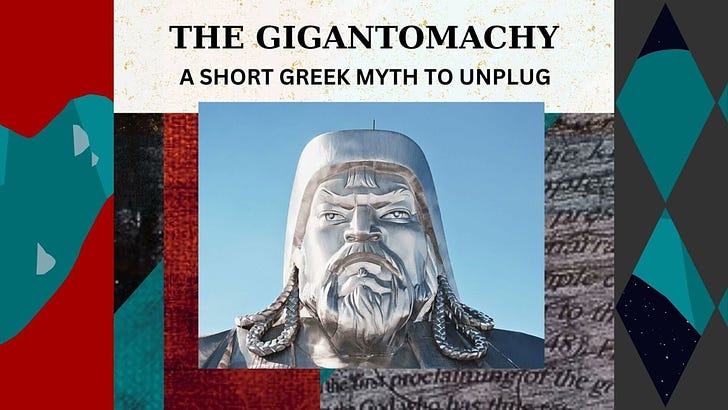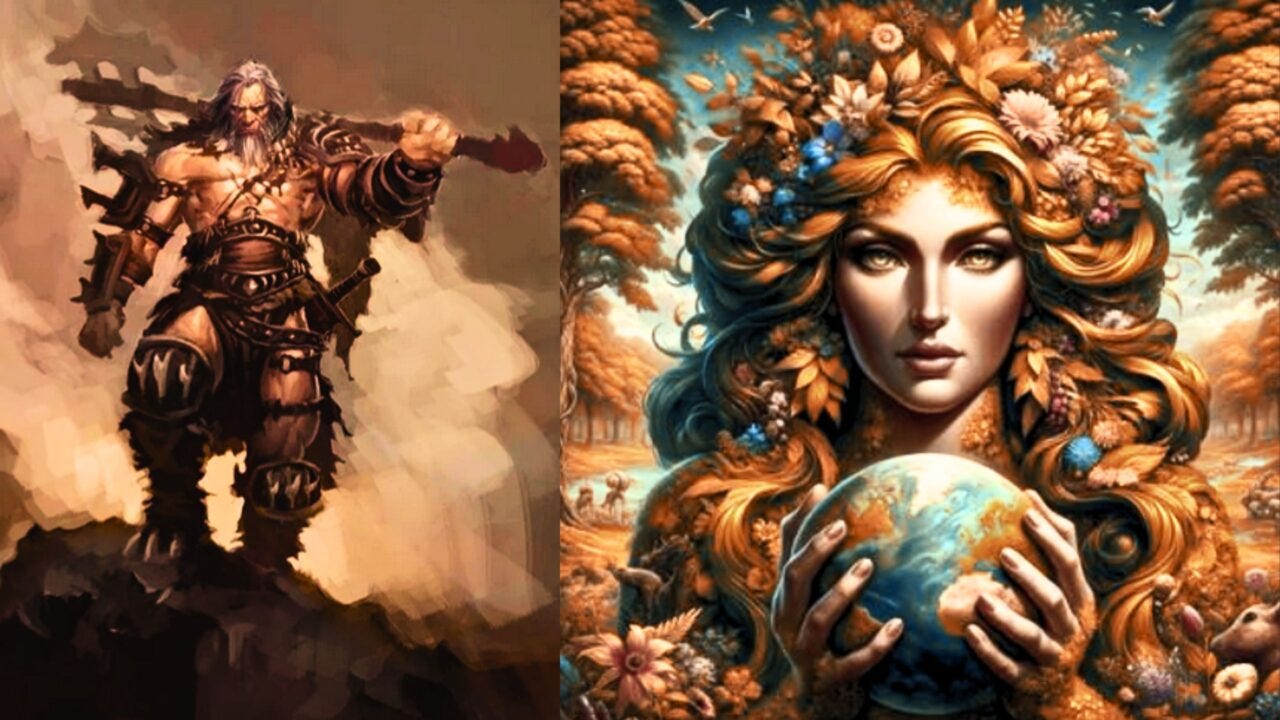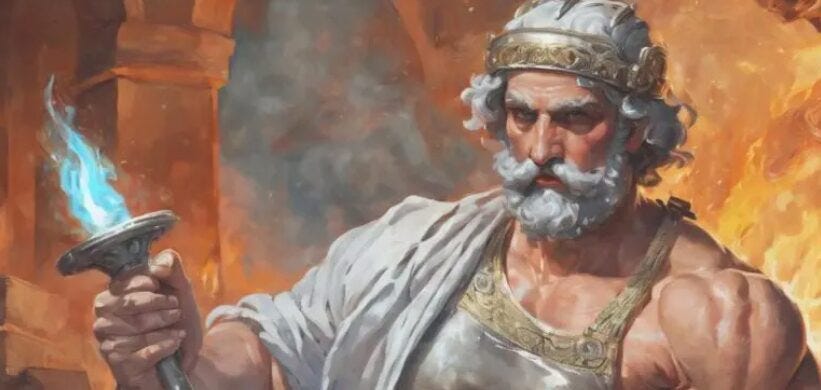Welcome to this story about the Gigantomachy, the struggles between the gods and the giants.
Several thousand years ago, there was a desperate struggle between the giants and the Olympians known as the Gigantomachy.
After a fierce battle, the gods finally prevailed through the help of Hercules the archer, and the giants were all slain.
Many of the downed giants were believed to lie buried underneath the mountains.. To indicate their presence, they would often produce volcanic fires.
Gaia Brought More Children and More Battles
The Olympians had cast down the reign of their father Kronos (or Chronos). They also imprisoned his siblings with torturous punishments, which would be carried out until the end of time.
Although Gaia, Mother of Kronos had called for the removal of her son from the throne of the world. She was not content with the punishments bestowed on the rest of her children.
In fact, she scoffed at the greed of the Olympians. These children were no different or better than her son or her husband before him.
These gods were not worthy to rule over the heavens and the earth. Their actions greatly offended Gaia, and she proclaimed in her frustration, Have they forgotten to revere the Earth, their Mother?
From her bitterness, she gave birth to a new race of children from the deepest underbellies of the Tartarus.
A race of giants, large, brooding, lawless, and lethal.
Many sources describe the giants as being clad in shining armor with beards and hair that brushed the floor.
Their lower bodies were covered in scales, and they are sometimes referred to as the Scaly Sons of Gaia.
They stood between thirteen and a half and eighteen feet high.
Most every giant was at least thirteen feet tall.
These giants had grown up in the deepest layers of Gaia, Mother Earth herself and Uranus was their father. When Cronos had castrated his father and thrown his genitals into the sea there were several other divine specimens that resulted from this action.
There was Aphrodite, who grew from the testicles themselves, the Furies, the Goddesses of Vengeance, and of course, the Giants.
This specific generation of Giants was known as the Thracian Giants, so named for the location of their birth. Gaia stirred up the Giants to go to war by proclaiming they needed to avenge her and the Titans by overthrowing Olympus.
She insisted they needed to cast down Poseidon and put him in chains at the bottom of the sea and rip out Apollo's organs.
Golden curls, Typhus, the great unclean serpent, could take control of Zeus's thunderbolt, and these beastly giants could claim the goddesses for themselves. They could tell stories about the rape of the virgin goddesses, Athena and Artemis, as well as the lovely Aphrodite.
Perhaps Gaia underestimated her children, the Giants, for when they heard her plan they were outraged by the poisonous words of their mother. So much so, they already believed themselves the victors.
They began to throw stones and flaming oak trees at the gates of heaven. They tormented mankind with taunts and attempted to provoke the Olympians into war.
Little did the giants know they would be in for one of the greatest battles of their lifetime.
Zeus, king of the Olympians, sent out one of his most trusted messengers, Iris, who is the Olympian goddess of the rainbow. She convened a council of the immortals from all over the world in order to aid the gods in their battle.
Even Hades and his queen Persephone emerged from their dark dwelling to defend the existence of Olympus.
When all the immortals had gathered, Zeus addressed them all with a war speech.
The following excerpt is translated from Hesiod's Theogony;
"Deathless army, whose dwelling place is, and must ever be, the sky. Ye whom no adverse fortune can ever harm, mark ye how earth with her new children conspires against our kingdom, and, undismayed, has given birth to another brood. Wherefore, for all the sons she bore, let us give back to their mother as many dead. Let her mourning last through the ages as she weeps by as many graves as she now has children."
Zeus - King of Gods
Giants Brought Big Changes
There is some dispute as to where this war occurred, many believe that it was located in Thrace, which was the original birthplace of the giants.
The Thracian tribes that existed north of Greece were considered to be barbaric in comparison to the sophisticated Greek civilization.
Thus, these tribes lawlessness is metaphorically attached to a race of vengeful and jealous giant abominations.
When the war began, nature was drastically thrown off balance. Each time the gods were provoked, there was an equal and opposite reaction in the natural world.
Rivers changed their direction, mountains collapsed, and huge water swells flooded the land.
In addition to this, the giants armed themselves with the elements of their mother Gaia in order to defeat the great weapons of the gods.
There was little that could rival the craftsmanship of the gods; Cyclops-forged weapons, but the giants were still coming for them. Ready for battle. The giants hurled great mountains and entire islands against the gods.
It was nothing for them to grab an island right out of the sea and throw it toward the heavens.
The entirety of the earth was in disarray, but the battle raged on. Each god and goddess contributed to a great and bloody victory.
However, the most referenced Olympian gods in the Gigantomachy are Zeus, Athena, Ares, and Hera.
There is also special attention paid to the mortal allies of the gods in this war, particularly the hero Heracles.
The entire atmosphere of the battlefield was clouded with the dust of ancient mountains and ash. There was so much chaos it was hard to tell the difference between the two armies.
Still, Ares was the first to charge into the fray, his shield and breastplate glistening red. His helmet sitting high on his brow, with a mighty swing of his sword he cleaved into the giant, Polorisus's groin, tearing him from stem to stern.
He then proceeded to ride over the body of the giant in his chariot, until pieces of him were smeared across the Earth. Athena also showed no hesitation in joining the battle. True to her nature, she was able to defeat her enemies with very little energy and a great deal of finesse.
During this battle, Athena wore the Gorgon Medusa's head on her own breastplate.
She knew this would be enough to stop anything in her path. She stood steadfast, with her spear and shield calmly reserved at her side as she thrust her breast forward.
The giant Pallas was the first to be turned to stone. Fear gripped him, and he exclaimed, "What is this icy feeling that grips my limbs?"
He dropped to his knees with a groan, which was soon turned into rock. In frustration over the loss of his two brothers, one of the giants heaved his brother's stone corpse at Athena. She stepped to the side with the same ease as before, and Pallas exploded on the mountain behind her. Athena could not be stopped in her defense of Olympus.
Her most heroic act came when she managed to bury the giant Enceladus underneath Mount Etna. To this day, Enceladus remains there, generating the volcanic lava that stirs within.
It was the Immortals and those born of mortal women who fought for Zeus in the War of the Gods that received the title Olympian.
Of course, Zeus was the most impressive Immortal in the Gigantomachy, as he brought an end to the most powerful of the giant race, Porphyrion. When Porphyrion rushed to rape Zeus's wife and queen, Hera, he threw thunderbolt after thunderbolt directly at the giant, who was struck dead by these blows.
During the Gigantomachy, there was plenty of treachery against the king of the gods, Zeus.
Zeus had only a few allies, but many enemies, even those he considered to be his friends. This included Olympos, a giant of reason who raised Zeus and taught him the order of the law and the secrets of the Earth.
Olympos betrayed Zeus by supporting the giants in their revolt against the gods.
This was devastating for Zeus.
In his anger, he struck down Olympos.
He was so grieved over the death of his foster father that he built Olympos a great tomb and named the resting place after himself so that people would think it was the grave of Zeus. Causing it to always be visited and revered.
The only giant to survive the battle was Aristeas.
He was spirited away to the island of Sicily by Gaia and transformed into a dung beetle so that he could be hidden from the gods.
The End.
Thank you for reading. I wish you many imaginative tales.
Renee is a voice over artist, writer/editor and coach for alternative thinkers --
This includes creatives, entrepreneurs, corporate innovators, whistleblowers and anyone bold enough to step outside the mainstream.
Find This Audio and THOUSANDS of others on the AURA app. Sign up for a FREE 30 day guest pass…
https://aurahealth.io/guestpass/renee
Shop Meditations and Narrations:
https://seekingnexus.gumroad.com
Life Energy Coaching: https://thewritersnexus.com/COACHING
Get A FREE Children's Story (Immediate Download)





